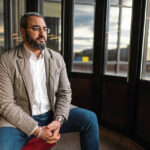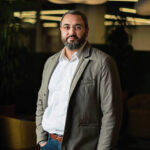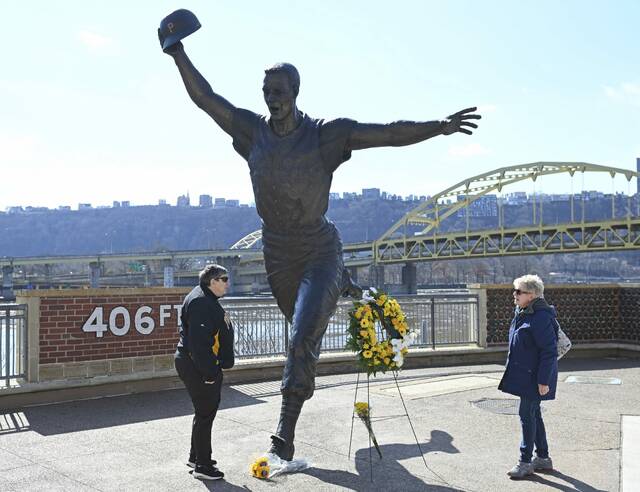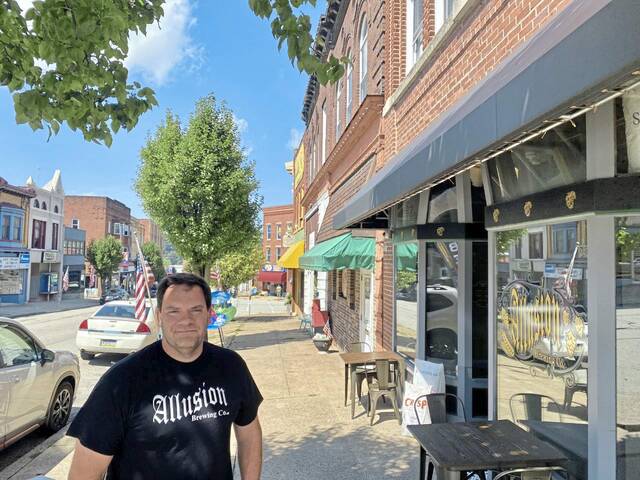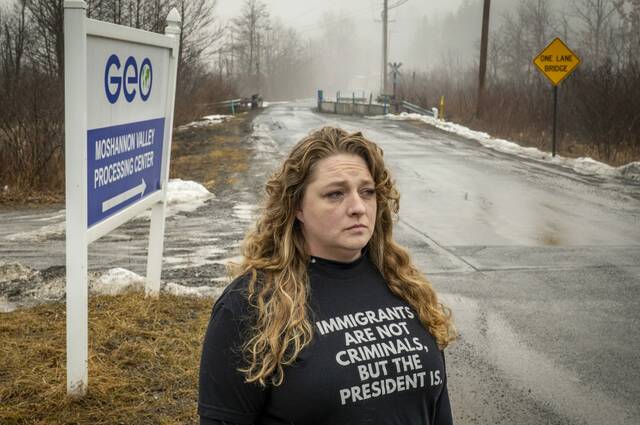Pittsburgher Ahmed Arafat grew up in Gaza under the specter of war.
Then on Dec. 24, Israel Defense Forces fatally shot his cousin while his cousin’s children watched. The man was waving a white flag at the time, trying to evacuate his home, Arafat said.
But Arafat, a tech worker and U.S. citizen who emigrated to Southwestern Pennsylvania at 17, grasps tightly onto hope for his four siblings and 14 nieces and nephews, each of whom struggle each day to survive in Gaza.
“Right now, my hopes and my prayers are that they stay alive. … I pray for the suffering to end,” said Arafat, 41. “There’s been enough bloodshed. I still believe in peace. I still truly believe in it. I believed in it in 1993 when I was just an 11-year-old boy. And I believe in it today as a grown man.”
In Pittsburgh, Arafat is not alone.
The region’s Palestinian-American community, whose family members number in the dozens, is dwarfed by other Pittsburgh-area ethnic groups. As incidents of Islamophobia and antisemitism rise locally and nationally — and in the wake of a war that has rocked Gaza for three months — that community now is raising its voice and sharing its story.
On Oct. 7, Hamas militants stormed southern Israel in a surprise weekend attack, killing 1,200 people, most of them civilians, and injuring thousands more in the largest killing of Jews since the Holocaust. Hamas captured about 250 hostages and later returned 105 of them during an eight-day cease-fire brokered by Egypt.
In response, the Israel Defense Forces launched a bombing campaign and a full-scale ground invasion in Hamas-governed Gaza. More than 22,700 Palestinians died in the weeks that followed, according to the Health Ministry in the Hamas-run territory. The count does not differentiate between combatants and civilians. The ministry has said two-thirds of those killed have been women and children.
By comparison, less than half that number — about 10,000 civilians — have been killed in Ukraine since Russia attacked that country in February 2022, according to the United Nations.
‘I’m not going to be judged solely by my appearance’
The war has hit Pittsburgh hard with dramatic spikes in antisemitism and Islamophobia.
People have scrawled graffiti about the war on school walls, on yard signs and across sidewalks. A conflict erupted over an Islamic art exhibit at a local museum. And Pittsburgh-area politicians have been thrust into the fray over their political stances on the war.
“There is blood on our hand,” one piece of graffiti read. “No Christmas in Bethlehem,” read a banner draped on a Pittsburgh bridge in December.
Reports of Islamophobic acts or anti-Muslim hate in Pittsburgh shot up 400% in the first two months of the war, according to Christine Mohamed, who has led Pittsburgh’s chapter of the Council on American-Islamic Relations (CAIR) since December 2019.
Nationwide, requests for help and reports of Islamophobic bias to CAIR have increased 216% year over year, the organization said. CAIR has called the post-Oct. 7 spike the largest wave of Islamophobic bias since then-presidential candidate Donald Trump proposed his “Muslim ban” in 2015.
Public school kids and college students have reported incidents. So have doctors, people protesting the war, and individuals who work in or pray in mosques.
Mohamed feels the change in Southwestern Pennsylvania.
“Everybody’s tired, everybody’s drained — but even your neighbors are looking at you with stand-offish eyes or even fear,” said Mohamed, 47, of West Mifflin. “People are walking on pins and needles. We just want people to be safe.”
On Oct. 26, pro-Palestine vandalism was spray-painted at Allderdice High School in Pittsburgh’s Squirrel Hill neighborhood. Some officials called the messages antisemitic.
Some teenagers responded by bullying Muslim students, Mohamed said.
“Gaza will be bombed into a parking lot,” some said, according to Mohamed.
Mohamed was raised Catholic and so were the two children from her first marriage, now ages 20 and 23. Mohamed converted to Islam as an adult and met her second husband, who was born in Egypt, at the Islamic Center of Pittsburgh in Oakland.
She finds elements of Islamic teachings and her faith, such as wearing a hijab, empowering.
“I think a relationship with God is a very personal decision — and no man is making that decision for me,” Mohamed said. “It really triggers some people. They see (the hijab) as oppression. I see it as feminism. I’m not going to be judged solely by my appearance.”
Mohamed feels the Islamophobic remarks and actions in the area — she has been on the receiving end of them, too — only make Pittsburgh Muslims work harder to positively represent their faith and their community.
“This is America: so many fabrics woven together is what makes us beautiful,” Mohamed said. “To see that unravel, that doesn’t make me happy.”
‘As a Palestinian, you’re always dealing with loss’
Karim Alshurafa, a Pittsburgher with family in Palestine, understands loss.
On one of the first days that the IDF bombed Gaza last autumn, a family member texted Alshurafa. His aunt had been killed.
Soon after, his uncle and several children died.
In the second week, Alshurafa’s family death toll topped 45. By the third week, seven more followed.
“We don’t know the exact count (of the dead), maybe 22 family members of the Alshurafa family and maybe 50 extended family members,” said Alshurafa, 40, of Pittsburgh’s North Hills. “Everybody needs to know: These are human beings here. They want the ability to live and to dream. And this is being robbed.”
Nearly 85% of the 2.3 million people living in the 25-mile-long Gaza Strip have been driven from their homes, according to the Health Ministry in Hamas-ruled Gaza. Survivors from Alshurafa’s family, who are among that group, fled south.
More than 40 relatives are living in an apartment near the Rafah crossing, the only passage from Gaza to Egypt. Alshurafa has been working with elected leaders to save his family, without luck.
Alshurafa was born in Kuwait, the sixth of seven children, and moved to Egypt when he was 8. His parents then moved the immediate family to Canada, where Alshurafa spent 23 years. He moved to Pittsburgh about 10 years ago.
Today a father of three and a businessman who runs a local steel-related company, Alshurafa is a practicing Muslim who remains active in his community. He attends Friday prayer services weekly.
He wears a keffiyeh, or traditional headdress, and is what those who study Islamophobia call “visibly Muslim.” His wife dons a hijab, a head covering worn in public by Muslim women.
“It’s important to see that all Muslims — all Muslims — have humanity,” he said. “The truth is no loss of life — innocent life — is acceptable. Period. On both sides. There are innocent people dying on both sides. And that’s unacceptable. Both sides need to be held responsible for that loss of innocent human life.”
Many people in Alshurafa’s family settled in Palestine, most of them in Gaza. The Alshurafa roots predate Mandatory Palestine, a region the League of Nations created after World War I that ended when Israel was founded in 1948.
“My father was displaced from his home and lost his brother to illness due to the displacement. They have been experiencing loss since the Nakba of 1948,” Alshurafa said. “It’s a reality of life. They’ve been processing this for 75 years. As a Palestinian, you’re always dealing with loss, always dealing with injustice. It’s really a shame.”
The Nakba, which means “catastrophe” in Arabic, refers to the mass displacement and dispossession of Palestinians during the 1948 Arab-Israeli war, according to the United Nations.
Local tensions
In Pittsburgh, the conflict continues to escalate existing tensions.
In October, The Frick museum in Point Breeze indefinitely postponed an Islamic art exhibit because its leaders were concerned it would offend local Jews. TribLive was the first to report the news, which gained national headlines. Jewish leaders joined Muslims groups in condemning the move, which Frick officials reversed.
“Islam in general and Muslims in the U.S. in particular are not responsible for Hamas, which is a terrorist organization,” said Adam Hertzman, a spokesman for the Jewish Federation of Greater Pittsburgh. “At a time that antisemitism is happening here, if you are blaming an entire sect for that happening, that is not right.”
Around the same time, more antisemitic graffiti was discovered in a parklet in Squirrel Hill’s Summerset at Frick housing development.
On Oct. 30, U.S. Sen. John Fetterman, who has voiced strong support for Israel, was confronted by pro-Palestine protesters at a West Homestead event. A week later, pro-Palestine protesters confronted him again, this time in McKeesport.
A group of 40 rabbis and Jewish cantors wrote to U.S. Rep. Summer Lee, D-Swissvale, condemning her votes on resolutions related to the war.
Later, another group composed of 130 progressive local Jews defended Lee and backed her in calling for a cease-fire.
The tensions have resonated right down to the polls.
After a candidacy that lasted 10 days, Squirrel Hill resident David Knoll garnered more than 2,800 write-in votes — not enough to win — in a race against Allegheny County Councilwoman Bethany Hallam, who critics said had tweeted offensive remarks about the war.
In 2022, the Anti-Defamation League said there were just under 3,700 antisemitic incidents nationwide, which was a 36% jump from 2021 and the highest number recorded since the ADL began tracking them in 1979.
Locally, the Jewish Federation of Greater Pittsburgh reported about 250 antisemitic incidents in 2023, twice the total reported in 2022.
Wounds from the Oct. 27, 2018, synagogue shooting in Squirrel Hill unbandaged by the shooter’s trial this summer also make the increase in antisemitism acute, some said. But the emergence of highly polarized politics and the lingering presence of white supremacists in the region also play a significant role.
In explaining the uptick in hate-related incidents, Jewish leaders point to a study about post-traumatic stress disorder, which reached its peak in Aurora, Ill., five years after a gunman opened fire in a movie theater there, killing 12 and injuring 70.
“A triggering attack like this one can absolutely bring those feelings up,” Hertzman said. “The family and the victims and survivors aren’t the only ones experiencing trauma, it brings back memories of that. It is difficult.”
The Gaza conflict is resonating in Pittsburgh five years after the synagogue shooting, the worst act of antisemitic violence in U.S. history.
Lynn Cullen, a former TV anchor who hosts a political podcast, said the synagogue shooting still raises tensions locally.
“All of it feels much more raw here,” said Cullen, who is Jewish and lives blocks from the site of the shooting. “It makes us fearful.”
‘Their homes have been reduced to rubble’
Before Reem Al-Dadah attended California University of Pennsylvania and lived in Pittsburgh for 18 years, she called Gaza home.
Born in Kuwait, Al-Dadah lived in Gaza — where her father was born in a refugee camp in 1945 — for two years before moving to the United States in 1992. Seven aunts and uncles, as well as their children and their children’s families, remain in the Gaza Strip, many of them in Jabalia, a city 2.5 miles north of Gaza City.
Al-Dadah fears that her family’s day-to-day reality in Gaza has grown dire.
Internet access and, more importantly, electricity continue to be sporadic. There is no gasoline. Food is rationed. Even clean water is difficult to find.
Al-Dadah’s relatives, Muslims who pray five times each day, cannot find water for ablution, the ritual washing of the hands and mouth three times before prayer, she said.
Instead, they use sand.
When her relatives recently were thirsty and couldn’t find bottled water to buy, they drank sea water, she said.
“We are not ‘human animals,’” said Al-Dadah, 44, referring to comments made Oct. 9 by Israel Defense Minister Yoav Gallant. “We are hard-working, persevering people. We just want an equal opportunity, a chance — just like everyone else.”
Al-Dadah, who lived in Stanton Heights and Morningside, now works as a licensed mobile therapist in Columbus, Ohio. Her five children range in age from 2 to 20.
The former Pittsburgher has been writing passionately to elected leaders in Ohio, seeking help to bring her relatives through Rafah Crossing and into Egypt. Like Alshurafa, she’s had no luck.
Al-Dadah worries there’s no figurative “light at the end of the tunnel” when — or if — foreign governments work to rebuild or revitalize a post-war Gaza.
“My family was blessed to be a well-to-do family,” she said. “But there’s nothing in the north (of the Gaza Strip) to go back to. Their homes have been reduced to rubble. Right now, they don’t need ‘things.’
“They’ve been requesting prayers, lot of prayers. And help getting out.”
‘Violence can’t be the answer’
Arafat has watched this storyline unfold before.
Born in an extension of a refugee camp, Arafat grew up in Gaza in the era of the First Intifada, a series of protests, riots and violence that frustrated Palestinians launched in 1987.
His youth was defined, though, by the White House signing the Sept. 13, 1993, Oslo Accord. Per the accord, Israeli Prime Minister Yitzhak Rabin and Palestine Liberation Organization (PLO) negotiator Mahmoud Abbas agreed the PLO would represent Palestinians, and the PLO renounced terrorism and recognized Israel’s right to exist in peace.
It was rarely peaceful growing up in Gaza, Arafat said. On some days, tanks would roll into his neighborhood and he could not go to school or leave the house.
“We got so used to the tear gas, the live bullets, the rubber bullets ricocheting around the house,” said Arafat, one of nine children. “You couldn’t really sleep. You were used to waking up at any moment.”
He remembers some relatives claimed they aged based on the rhythms of political conflict. In Gaza, you don’t say you’re 30 or 31, he said. Instead, he said, you say “you’re 4 or 5 wars old.”
Still, the scope of the Oct. 7 attacks rattled Arafat, who said he “sympathizes 100% with people who have lost family members on both sides.”
While he maintains a positive outlook, he continues to mourn the thousands of Palestinian children killed.
“When I look at those kids, they look like my kids, they speak like my kids. So, as far as I’m concerned, they are my kids,” Arafat said. “I can’t believe that in 2023 we don’t have enough humanity in all our hearts to say that violence can’t be the answer, that sending more bombs won’t make anyone safe.
“I don’t care what side of the aisle you’re on. I don’t care if you’re pro-Palestine or pro-Israel. We should all agree that enough kids have been killed, and it needs to stop.”




